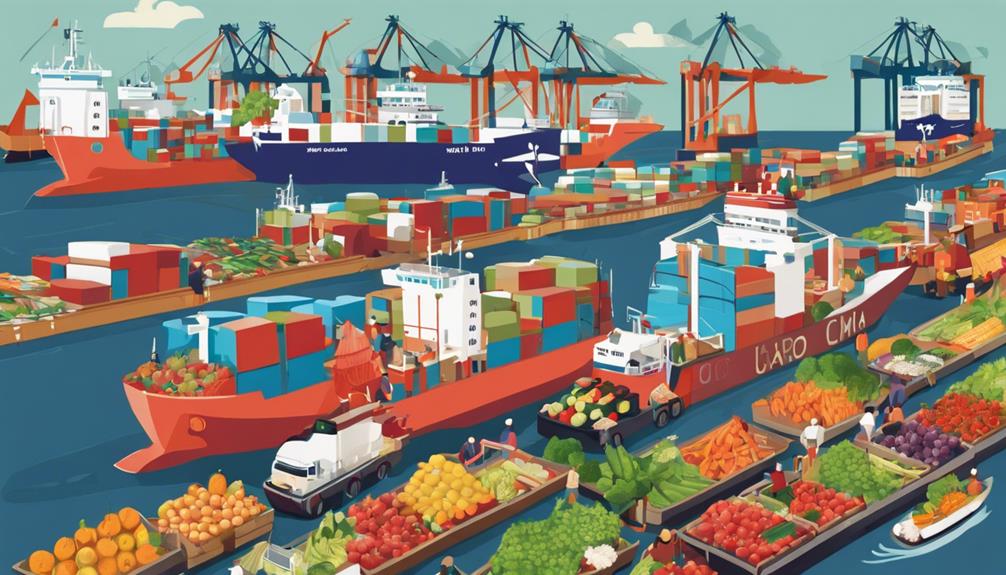Mastering the Global Trade of Organic Foods
To master the global trade of organic foods, analyze market trends, identify key players like Organic Trade Association and Whole Foods Market, and navigate complex regulations. Overcome challenges such as diverse standards and high certification costs by strategizing meticulously and building reliable supply chains. Embrace sustainability practices like transparent supply chains and eco-friendly packaging. Explore market expansion opportunities with innovative branding and digital marketing. The future outlook involves emphasizing organic certification, leveraging technology, and educating consumers. Understanding these facets is crucial for success in the dynamic world of organic food trade.
Understanding Global Organic Food Market Trends
To comprehend the current trends in the global organic food market, examine the sales data of major retailers over the past five years. Consumer preferences play a crucial role in shaping the organic food market landscape. Market research indicates a growing demand for organic products due to increased health consciousness and environmental concerns among consumers. This trend is evident in the rising sales figures of organic foods across various regions.
Understanding the supply chain and distribution channels is essential for navigating the global organic food market. Organic products often follow a complex supply chain that involves multiple stakeholders, including farmers, processors, distributors, and retailers. Efficient distribution channels are crucial for ensuring the availability of organic products to consumers worldwide. Market research shows that optimizing these channels can lead to increased market penetration and sales.
Analyzing consumer preferences and market research data provides valuable insights into the dynamics of the global organic food market. By staying informed about changing consumer trends and preferences, businesses can tailor their products and marketing strategies to meet the evolving demands of the market. Additionally, a deep understanding of the supply chain and distribution channels enables companies to streamline operations and enhance the accessibility of organic products to a wider consumer base.
Key Players in International Organic Trade
Key players in international organic trade significantly influence the global market dynamics with their strategic partnerships and market presence. These influential entities shape the landscape of organic food trading, impacting supply chains and market trends around the world.
- Organic Trade Association (OTA): The OTA plays a crucial role in setting industry standards and advocating for organic farming practices. Their influence extends globally, shaping regulations and promoting trade partnerships that benefit organic producers.
- Whole Foods Market: As a leading retailer of organic products, Whole Foods Market has a significant impact on consumer trends and demand for organic foods. Their sourcing strategies and partnerships with organic suppliers influence the availability of organic products in various regions.
- European Union (EU) Organic Certifiers: The EU has stringent organic certification standards, making their certifiers key players in ensuring the integrity of organic products in international trade. Their certifications facilitate market access and promote consumer trust in organic foods.
- China Organic Food Development Center: With the growing demand for organic products in China, this organization plays a vital role in promoting domestic organic farming and facilitating trade partnerships with international suppliers. Their efforts contribute to the expansion of the global organic market.
- Fair Trade USA: Fair Trade practices are increasingly important in the organic food industry, promoting ethical sourcing and sustainable production. Fair Trade USA's certifications support trade partnerships that prioritize fair wages and environmental stewardship, influencing market dynamics towards more responsible practices.
Regulations Impacting Organic Food Globalization
Regulations governing organic food standards play a pivotal role in shaping the globalization of organic food trade. Organic certification is a fundamental aspect of these regulations, ensuring that products meet specific criteria to be labeled as organic. Different countries have varying organic certification standards, causing complexities in international trade. Harmonization of these standards through trade agreements is crucial to facilitate the smooth flow of organic products across borders.
Trade agreements play a significant role in organic food globalization by establishing mutual recognition of organic certifications between countries. For instance, the European Union recognizes the USDA organic certification, enabling American organic products to be sold in EU markets without additional certification. Such agreements reduce trade barriers and promote the expansion of organic markets globally.
Moreover, regulations impacting organic food globalization extend beyond certification requirements. They encompass labeling standards, production methods, and the use of synthetic inputs. Adherence to these regulations not only ensures the authenticity of organic products but also builds consumer trust in the organic supply chain.
As the global demand for organic products continues to rise, adherence to regulations becomes increasingly important. By standardizing organic certification and fostering international trade agreements, the organic food industry can thrive on a global scale while maintaining the integrity of organic practices.
Challenges of Exporting Organic Products
Navigating the complex web of international regulations poses significant challenges for exporters of organic products. When it comes to exporting organic products, ensuring quality control throughout the supply chain becomes paramount. Here are some key challenges faced by exporters in this industry:
- Diverse Regulatory Standards: Different countries have varying regulations and standards for organic products, making it difficult for exporters to comply with all requirements simultaneously.
- Certification Costs: Acquiring organic certifications can be expensive, especially when considering the fees for each market the products are being exported to.
- Logistical Complexity: Managing the logistics of exporting organic products, such as ensuring proper storage and transportation conditions, adds another layer of complexity to the process.
- Market Access Barriers: Some countries have strict import regulations that may act as barriers to entry for organic products, limiting the export opportunities available.
- Documentation and Paperwork: Exporting organic products often requires extensive documentation to prove compliance with organic standards, adding administrative burdens to the exporting process.
Successfully navigating these challenges requires exporters to have a deep understanding of the regulatory landscape, a robust quality control system in place, and a well-structured supply chain to ensure the products reach their destination in optimal condition.
Strategies for Successful Importing of Organic Foods
Successfully importing organic foods requires meticulous planning, stringent quality control measures, and a thorough understanding of market demands and regulations. Market research is a crucial initial step. Analyzing trends, consumer preferences, and regulatory requirements in the target market can help you tailor your products to meet specific needs. Understanding the competitive landscape and pricing strategies of other organic food importers is also essential to position your products effectively.
Developing a robust supply chain is paramount. Identifying reliable suppliers who adhere to organic standards is non-negotiable. Establishing clear communication channels, setting quality benchmarks, and ensuring timely deliveries are key aspects of a successful supply chain. Implementing technology solutions like track-and-trace systems can enhance transparency and traceability throughout the import process.
Moreover, staying updated on market regulations and certifications is imperative. Different countries have varying organic standards, and compliance is essential to avoid entry barriers. Building strong relationships with customs brokers, freight forwarders, and regulatory bodies can facilitate smooth imports. Engaging with industry associations and trade organizations can provide valuable insights and networking opportunities to navigate the complexities of importing organic foods efficiently.
Sustainability Practices in Global Organic Trade
In global organic trade, implementing sustainable practices is pivotal for fostering environmental stewardship and long-term business viability. Sustainable practices not only help preserve the planet but also resonate with the increasing consumer demand for ethically sourced products.
Here are some key considerations for incorporating sustainability practices into the global organic trade:
- Supply Chain Transparency: Ensuring transparency in the organic supply chain is essential to trace the origins of products, guarantee organic certification, and maintain integrity throughout the process.
- Reducing Carbon Footprint: Implementing strategies to reduce carbon emissions in transportation and production processes can significantly lower the environmental impact of organic trade.
- Water Conservation: Prioritizing water-efficient practices in organic farming and processing helps conserve this precious resource and promotes sustainability within the industry.
- Packaging Innovation: Opting for eco-friendly packaging solutions, such as biodegradable materials or recyclable packaging, minimizes waste and aligns with sustainable principles.
- Certifications and Standards: Adhering to recognized organic certifications and sustainability standards ensures compliance with regulations, builds trust with consumers, and enhances the credibility of organic products in the global market.
Market Expansion Opportunities for Organic Products

To capitalize on the growing demand for organic products, exploring market expansion opportunities is key for global organic trade. In order to effectively expand the market for organic products, businesses need to focus on optimizing their distribution networks and implementing innovative branding strategies.
Expanding distribution networks is crucial for reaching new customers and increasing sales of organic products. By establishing partnerships with retailers, wholesalers, and e-commerce platforms in different regions, organic producers can ensure that their products are widely available to consumers worldwide. Utilizing efficient logistics and supply chain management practices can help reduce costs and improve the overall reach of organic products in the global market.
In addition to enhancing distribution networks, implementing effective branding strategies is essential for standing out in the competitive organic food industry. Building a strong brand identity that emphasizes the values of sustainability, health, and quality can help attract and retain loyal customers. Leveraging digital marketing techniques, such as social media campaigns and influencer partnerships, can also help organic brands increase visibility and engagement with target audiences.
Future Outlook for Organic Food Global Trade
Looking ahead, the organic food global trade sector is poised for significant growth and evolution driven by shifting consumer preferences and increasing awareness of sustainability practices. As the demand for organic products continues to rise, several key factors will shape the future outlook for organic food global trade:
- Organic Certification: The importance of organic certification will increase as consumers seek transparency and authenticity in the products they purchase. This certification ensures that products meet specific organic standards, instilling trust in consumers and facilitating international trade.
- Supply Chain: Efforts to streamline the organic food supply chain will be crucial in meeting the growing demand. Improving logistics, transparency, and traceability throughout the supply chain will help maintain the integrity of organic products and meet regulatory requirements.
- Market Expansion: The global reach of organic food trade is expected to expand further, with emerging markets showing a growing interest in organic products. This presents opportunities for producers to tap into new markets and diversify their customer base.
- Technological Advances: Innovations in technology, such as blockchain and IoT sensors, will play a significant role in enhancing the efficiency and transparency of the organic food supply chain. These advancements will enable real-time tracking of products and ensure compliance with organic standards.
- Consumer Education: Educating consumers about the benefits of organic products and the importance of supporting sustainable practices will be essential for driving continued growth in the organic food global trade sector. Increasing awareness and understanding of organic certifications can further boost consumer confidence and demand.
Conclusion
In conclusion, mastering the global trade of organic foods requires a deep understanding of market trends, key players, regulations, challenges, and sustainability practices.
By developing effective strategies for importing and exporting organic products, businesses can capitalize on market expansion opportunities and navigate the complexities of international trade.
With a proactive approach and a commitment to quality, the future outlook for organic food global trade looks promising for those willing to adapt and innovate.
